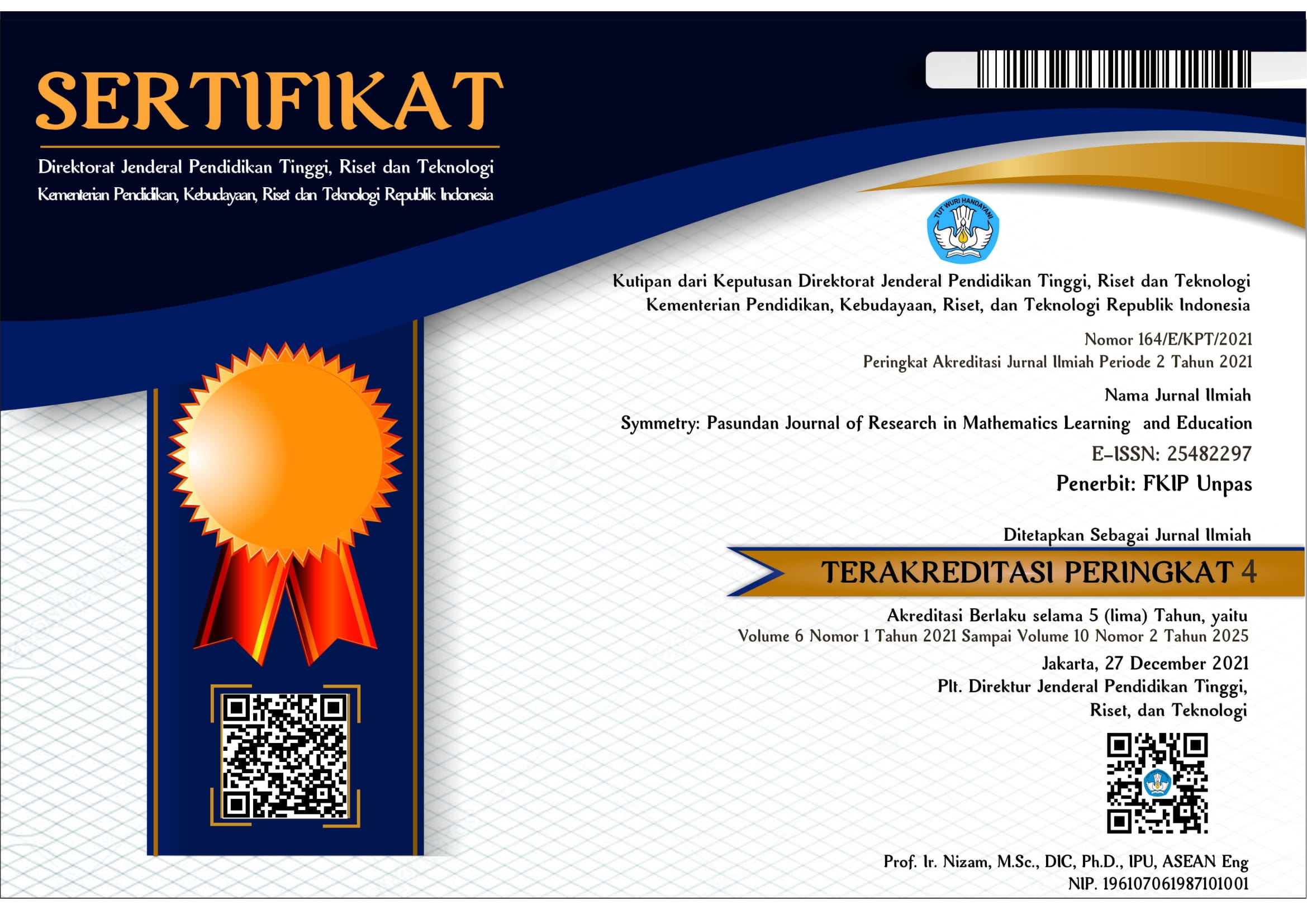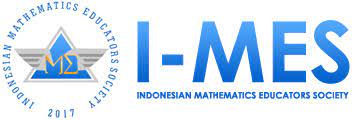HUBUNGAN ANTARA SELF ANXIETY DAN INTELLIGENCE QUOTIENT (IQ) TERHADAP KEMAMPUAN PENALARAN MATEMATIS SISWA SMA
Abstrak, Pendahuluan, Metode, Hasil dan Pembahasan Kesimpulan, Referensi
DOI:
https://doi.org/10.23969/symmetry.v9i2.20183Abstract
This study aims to explore the relationship between self anxiety, intelligence quotient (IQ), and mathematical reasoning ability in senior high school students. The approach used in this study was a quantitative method with a correlational design, which involved the application of partial regression and multiple regression analysis. The research sample consisted of 31 students selected from two schools in Bandar Lampung, namely SMA Negeri 5 and SMA Negeri 15, which were taken from a population of 56 grade XI students. Data in this study were collected through test and non-test instruments. The analysis showed that self anxiety and Intelligence Quotient contributed 55.9% to students' mathematical reasoning ability, while the remaining 44.1% was influenced by other variables that were not the focus of this study.
Downloads
References
Amelia, T., & Ulfah, S. (2022). Pengaruh Kecemasan Matematika Siswa Terhadap Kemampuan Penalaran Matematis Pada Pembelajaran Daring. JIPM (Jurnal Ilmiah Pendidikan Matematika), 11(1), 81-92.
Ardana, Aritonang & Dermawan. 2013. Kecerdasan Intelektual, Kecerdasan Emosional, Kecerdasan Spiritual, Dan Kesehatan Fisik Untuk Memprediksi Prestasi Belajar Mahasiswa Akuntansi. Jurnal Akuntansi. Volume XVII, No. 03, September 2013.
Ariati, C., & Juandi, D. (2022). Kemampuan penalaran matematis: systematic literature review. LEMMA: Letters Of Mathematics Education, 8(2), 61-75.
Cervone, D., & Pervin, L. A. (2022). Personality: Theory and research. John Wiley & Sons.
Erika, A., Qomari, N., & Noviandari, I. (2021). Pengaruh kecerdasan intelektual, kecerdasan emosional dan kecerdasan spiritual terhadap prestasi belajar. UBHARA Management Journal, 1(1), 122-134.
Ermawati, D., Nihayati, N. F., Marlin, C. M., Aleansyah, F., & Noviyanti, P. A. (2023). Pengaruh Model Pembelajaran Teams Games Tournament Terhadap Hasil Belajar Matematika Siswa Kelas V SD 1 Gribig. Jurnal Theorems (The Original Research Of Mathematics), 8(1), 93–103.
Fatonah, T. N., & Izzati, N. (2023). HUBUNGAN REGULASI DIRI DENGAN KECEMASAN BELAJAR MATEMATIKA YANG DIMILIKI PESERTA DIDIK KELAS VII MTs. Jurnal THEOREMS (The Original Research of Mathematics), 7(2), 234-242.
Gay, L. R., Mills, G. E., & Airasian, P. W. (2012). Educational research: Competencies for analysis and applications. Pearson.
Ginting, S. O., Efendi, N., & Purnaya Sari Br. Tarigan. (2020). Pengaruh Intelligence Quotient, Emotional Quotient terhadap Kinerja Melalui Spiritual Quotient. Jurnal Ilmiah Akuntansi Dan Bisnis, 5(2), 47–69.
Khardita, D., Asih, T. S. N., & Agoestanto, A. (2023). ANALISIS KEMAMPUAN PENALARAN MATEMATIS DITINJAU DARI KEMANDIRIAN BELAJAR PADA MODEL PEMBELAJARAN STUDENT FACILITATOR AND EXPLAINING (SFE) DENGAN METODE FLIPPED LEARNING BERBANTUAN GOOGLE CLASSROOM. Symmetry: Pasundan Journal of Research in Mathematics Learning and Education, 8(2), 178-184. https://doi.org/10.23969/symmetry.v8i2.10806
Hairina, R. R., Mardijana, A., & Fajar Kusuma, I.(2012). Kecerdasan dan Kecemasan pada Siswa Berhubungan Kuat Menjelang Ujian Akhir Semester (A Strong Relation Between Intelligence and Anxiety of Students Towards Final Semester Exam).
Hidayat, W., & Ayudia, D. B. (2019). Kecemasan matematik dan kemampuan pemecahan masalah matematis siswa SMA. Kalamatika: Jurnal Pendidikan Matematika, 4(2), 205-214. https://doi.org/10.22236/KALAMATIKA.vol4no2.2019pp205-214
Justel, A., Peña, D., & Zamar, R. (1997). A multivariate Kolmogorov-Smirnov test of goodness of fit statistics & probability letters, 35(3), 251-259.
Lestari, A., Santosa, C. A. H. F., & Sudiana, R. (2021). Pengaruh intelligence quotient (IQ) dan emotional spiritual quotient (ESQ) terhadap hasil belajar matematika siswa sma (studi korelasi siswa sma se-Kota Serang). JPMI (Jurnal Pembelajaran Matematika Inovatif), 4(3), 497 506. https://doi.org/10.22460/jpmi.v4i3.p%25p
Listiani, T., Dirgantoro, K. P. S., Saragih, M. J., & Tamba, K. P. (2019). Analisis Kesalahan Mahasiswa Pendidikan Matematika Dalam Menyelesaikan Soal Geometri Pada Topik Bangun Ruang [Error Analysis Of Students In The Mathematics Department In Solving Geometry Problems On The Topic Of Solid Figures]. JOHME: Journal of Holistic Mathematics Education, 3(1), 44. https://doi.org/10.19166/johme.v3i1.1708
Montague, M., & Applegate, B. (2000). Middle school students' perceptions, persistence, and performance in mathematical problem solving. Learning Disability Quarterly, 23(3), 215-227.
Muhsana, N., & Diana, H. A. (2022). Pengaruh kecemasan matematika terhadap kemampuan penalaran matematis berbasis soal PISA. Jurnal Pendidikan Matematika UNILA, 10(1), 41-52.
Munasiah, M. (2016). Pengaruh Kecemasan Belajar dan Pemahaman Konsep Matematika Siswa terhadap Kemampuan Penalaran Matematika. Formatif: Jurnal Ilmiah Pendidikan MIPA, 5(3), 220–232. http://dx.doi.org/10.30998/formatif.v5i3.649
Ningsih, S., & Dukalang, H. H. (2019). Penerapan Metode Suksesif Interval pada Analsis Regresi Linier Berganda. Jambura Journal of Mathematics, 1(1), 43–53. https://doi.org/10.34312/jjom.v1i1.1742
Prahmana, R. C. I., Sutanti, T., Wibawa, A. P., & Diponegoro, A. M. (2019). Mathematical anxiety among engineering students. Infinity Journal, 8(2), 179-188. https://doi.org/10.22460/infinity.v8i2.p179-188
Pramesty, D. A., & Pujiastuti, H. (2023). Analisis Kemampuan Pemecahan Masalah Matematis Ditinjau Dari Motivasi Belajar Matematika Siswa. Jurnal THEOREMS (The Original Research of Mathematics), 8(1), 34-43.
Santoso, I., & Madiistriyatno, H. (2021). Metodologi penelitian kuantitatif. Indigo Media.
Slameto. (2010). Belajar dan Faktor-Faktor yang Mempengaruhinya. Jakarta: Rineka Cipta.
Sofyana, U. M., & Kusuma, A. B. (2018). Upaya meningkatkan kemampuan penalaran matematis siswa menggunakan pembelajaran generative pada kelas VII SMP Muhammadiyah Kaliwiro. Kontinu: Jurnal Penelitian Didaktik Matematika, 2(1), 14-29.
Sudjana, N. (2005). Dasar-dasar Proses Belajar Mengajar. Remaja Rosdakarya.
Taherdoost, H. (2016). Sampling methods in research methodology; how to choose a sampling technique for research. International journal of academic research in management (IJARM), 5.
Downloads
Published
Issue
Section
License
Copyright (c) 2024 Symmetry: Pasundan Journal of Research in Mathematics Learning and Education

This work is licensed under a Creative Commons Attribution 4.0 International License.
Hak Cipta sepenuhnya ditangan jurnal.



















